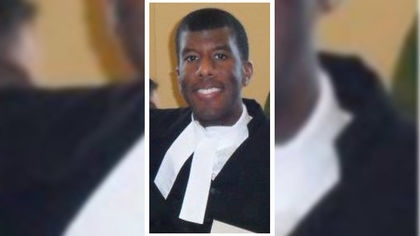(Originally published in the Halifax Examiner, March 6, 2017.)
When I was a young CBC reporter back in the 1970s, I got a tip from a source inside the department of health the RCMP was investigating a Shubenacadie doctor named Ross McInnis for MSI fraud. I didn’t realize it at first, but I would later discover it was the first health care fraud investigation ever initiated by RCMP officers directly rather than as the result of a routine audit of a doctor’s billing records.
A few weeks after the report was broadcast, I got a call from McInnis who wanted to share his side of the story.
Over the course of eight hours one day, he laid out his strange, shocking tale, all of which I was eventually able to independently verify.
Although he was extremely popular with his own patients, McInnis acknowledged he could also be someone who didn’t always get along with authority, including members of the local RCMP detachment. So they’d begun to target him, following his car, catching him not coming to a complete stop at a stop sign, or for some other minor offence, and then charging him.
Although he was a licenced gun collector, they seized his collection of antique guns and rifles as part of an “investigation.”
When they launched their MSI fraud probe, they raided his home and office. At his home, they gathered risqué personal photos of the doctor and his friends, who happened to be involved in consensual spouse swapping. At his office, they seized other photos and films of young patients, many in their underwear, walking around in his office. In those pre-computer, pre-Internet days, McInnis sent the images off to specialists in Halifax to help pre-diagnose various medical conditions before referring them for appointments.
But the Mounties mixed the two sets of images together and used them to justify yet another criminal investigation of possessing pornography— and to further sully his personal and professional reputation.
Later, the RCMP charged him with performing an illegal abortion. He was subsequently acquitted.
But his reputation — professional and personal — was in tatters.
It took many years before McInnis was able to convince the provincial government to appoint an inquiry into the RCMP harassment against him. The inquiry vindicated him. Ross McInnis died in 2014.

(Credit: Toronto Sun)
I couldn’t help thinking about the McInnis case recently while I was researching the story of Lyle Howe, the young African Nova Scotian lawyer who is the still ongoing subject of the longest and most expensive investigation in Nova Scotia Bar Society history.
The parallels aren’t precise, of course. McInnis was white, and Howe is black, and that adds an inevitable layer of complication to everything. And my own sense is that, in the beginning at least, the bar society, unlike the RCMP, genuinely wanted to help Howe.
The problem was they could never fully comprehend what social worker and consultant Robert Wright — a bar-society-appointed expert — would describe as Howe’s “status as a black lawyer and the multi-generational and certainly lifelong experiences of racism, discrimination and racial trauma that he has suffered. [Howe] has a deep, natural and historically understandable distrust in white folk and their systems or their ability to care about and understand his [situation]… ”
Howe’s own distrust, coupled with the society’s inevitable failure to make him conform to its norms, only escalated the disconnect. It also helped generate more new complaints — most of them relatively minor and bureaucratic in the grand scheme of things, and most of them generated by other (white) lawyers and judges rather than clients — but all of them combining to transform the society’s desire to help Howe into a realty he saw as anything but helping.
Couple that with the related/unrelated, piling-on criminal charges against him — one of which clearly never had merit — and you begin to understand why, like McInnis before him, Lyle Howe believed he had a target on his back.
As Laura McCarthy, Howe’s law partner and wife, puts it: “I think if you look hard enough at anyone, you’ll find what you’re looking for.”
Whether it’s there or not.
Remember Ross McInnis.




 STEPHEN KIMBER, a Professor of Journalism at the University of King's College in Halifax and co-founder of its MFA in Creative Nonfiction Program, is an award-winning writer, editor and broadcaster. He is the author of two novels and eight non-fiction books. Buy his books
STEPHEN KIMBER, a Professor of Journalism at the University of King's College in Halifax and co-founder of its MFA in Creative Nonfiction Program, is an award-winning writer, editor and broadcaster. He is the author of two novels and eight non-fiction books. Buy his books
Sadly I do remember Ross McInnis a bit too well. As a teenager I called him on a Saturday morning. I was very sick with infected glands. We were in the office alone with no support staff there. He told me to take my shirt off so he could listen to my chest – I did not have a cough or any other cold like symptoms, just the infected glands. He told me to turn around so he could listen to my back. When I did he unhooked my bra and removed it. I have never felt so vulnerable in my life. He then told me there was nothing wrong with me and chastised me for calling him in on the weekend. Please note he was not my doctor – he was just on call that weekend. I left his office in tears. I drove straight to the Elmsdale Medical Clinic where I was not a patient. A doctor there who had never seen me before took one look at me and took me in her office before HER patients she was there to see. She put me on a huge dose of antibiotic and pain killers and said if I didn’t improve in 48 hours to go to emergency. The next time I saw MY doctor, I reported to her what had happened with Dr. McInnis. Very shortly thereafter she left his office and opened her own.I do know that many people loved him but to me and I am guessing to many more young women who saw him, he was nothing but a perv.